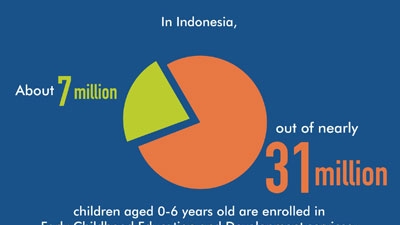Jakarta, INDONESIA - How can young children living in remote rural areas receive the benefits that early childhood services may provide? A new World Bank publication, Early Childhood Education and Development (ECED) in Poor Villages of Indonesia: Strong Foundations, Later Success, highlights innovative, community-based strategies, and the promising outcomes for young children.
The focus of the study is the impact of a government initiative launched in 2008 that widens access to early childhood services in 3,000 villages across 50 districts. Every young child has enormous potential, yet poverty and inequality impede the optimal development of many children.
The book outlines research conducted in some 310 villages, involving more than 6,000 children. The impact of early childhood services on these children and their families is documented by a random sample of villages. These observations provide insights for anyone who is concerned about early childhood development in Indonesia and beyond.
What the study reveals
Before Early Childhood Services Were Available: Children’s Achievements and Challenges:
- When studied at baseline (before the project’s ECED services were implemented), children typically showed much independence, cooperation and helpfulness toward others.
- At baseline, most of the children were able to speak clearly, express their wants and needs to others, play imaginatively, tell stories and show understanding of the everyday world around them.
- Although most of the children could not draw detailed pictures of people and houses at age 4—suggesting limited conceptual development compared to children in many other countries, their ability had improved considerably a year later.
- Many concerns were revealed by the baseline data: perhaps most worryingly, nearly 25 percent of 5 year olds were stunted or underweight for their age—placing children at great risk for intellectual as well as physical difficulties in later years. A similar pattern is seen in younger children.
- The mothers in this sample do not breastfeed for as long as is recommended, and only 30 percent of mothers breastfeed exclusively for 6 months. The mothers also admit that their children’s daily diets include snacks more often than vegetables or milk.
- Children need basic literacy and math skills to be ready for school, yet the poor Indonesian children in this study notably lacked these skills.
- Along with lack of group programs for preschoolers, their home experiences most likely influence this lack of competence: Approximately 17 percent of 4-year-olds never draw or scribble at home, and over 60 percent of the poorest children grow up in households without children’s books. Even among the richest quintile of children, nearly 30 percent of children do not have books.
Intervening to Make a Difference
- These and other data indicated an urgent need for services to promote positive development and learning. The government of Indonesia, with support from the World Bank, used a participatory planning process to establish new ECED services (usually, playgroups for preschoolers) in poor rural villages across 50 districts—reaching approximately 500,000 children.
- A training system for master trainers and local teachers, combined with district commitments, national standards, and other quality assurance tools, aimed to ensure long-term sustainability and expansion of ECED initiatives.
The Impact
- A randomized impact evaluation, comparing villages that received these services with villages that did not receive these services, provides encouraging evidence, even before the conclusion of the project.
- Having new ECED services in villages resulted in significantly increased enrollment—the first step in improving outcomes for these at-risk young children.
- The poorer the children, the more benefit from having these services in their villages. The poorest children showed the greatest gains in cognitive and language development, both critical areas for readiness and school success, and the weakest areas at baseline.
- Positive impacts were also greater for girls, a group at risk in many poor communities.
- And finally, the benefits were greatest for children who had not previously been enrolled in any kind of ECED service.
- Overall, even in the short run, the services hold the greatest benefits for those who need them the most: a powerful piece of evidence.
Lessons for Policy and Practice:
- Despite these promising results, gaps in certain services and, at times, lack of full implementation led to less-than-optimal outcomes in some areas. A number of lessons were learned that can inform policies and practices in the future:
- Especially considering baseline data on home environments, family-focused interventions , such as parenting education or home visiting programs, are needed to improve child outcomes, yet these services are not yet strongly emphasized in current ECED programs.
- Comprehensive ECED services that cover health, education and social protection are needed for children between the ages of 0-6. At present, there is little integration and synergy between education-focused services and services focused on parenting, health, and nutrition. The Government of Indonesia is moving toward a Holistic and Integrated Early Childhood Education and Development (HI-ECED) model for upcoming initiatives using lessons learned from this project.
- Long-term sustainability of services and positive outcomes will require supportive policies, systems, and resources. Progress was made with support from this project. Further efforts and promising innovations are underway at both the local and the national levels.


